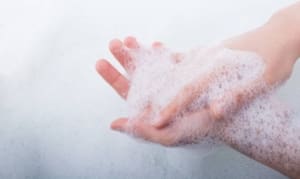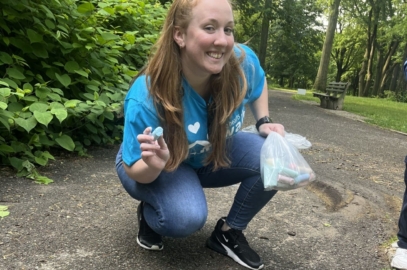December 10, 2019

The Centers for Disease Control and Prevention (CDC) recently launched a new national campaign, Life is Better With Clean Hands, to encourage adults and children to make clean hands a part of their daily lives. The campaign raises awareness of the importance of handwashing during key moments at home and in public, such as before and during cooking and after using the bathroom.
Why is it so important to wash your hands?
Hand washing is an easy and effective way to help you and your loved ones stay healthy, especially during those times when you are most likely going to spread germs. Germs get onto hands after people have used a toilet or changed a diaper. They can also spread after handling raw meat or after touching an object that has germs on it because someone has sneezed or coughed and then contaminated the object. Germs can be transferred into foods or drinks that people prepare. They can be transferred to handrails, toys, or the tops of tables.
Handwashing with soap and clean running water, protects about 1.8 million children, under the age of 5, who die each year from the top two killers of young children around the world – diarrheal diseases and pneumonia. Hand washing also helps in the battle against the rise of antibiotic resistance.
As a rule, you should wash your hands before, during, and after these key moments:
- Preparing food
- Eating food
- Caring for someone who is sick with vomiting or diarrhea
- Treating a cut or wound
- Using a toilet
- Changing a diaper or cleaning up a child who has used a toilet
- Blowing your nose, coughing, or sneezing
- Touching an animal, animal waste, animal food, animal treats
- Handling garbage
Is there a special way you should wash your hands?
The five steps to wash your hands are:
- Wet your hands with clean, running water. Turn off the water and apply soap to your hands.
- Lather your hands by rubbing them together with the soap. Make sure to wash the back of your hands, between your fingers, and under your nails.
- Scrub your hands for at least 20 seconds. Try singing the “Happy Birthday” song two times from the beginning to the end.
- Rinse your hands under clean, running water.
- Dry your hands with a clean towel or air dry them.
While handwashing is the best approach to washing your hands to get rid of germs if you don’t have access to clean running water or soap you can use a 60% alcohol-based hand sanitizer instead. Hand sanitizers can help reduce the number of germs on your hands but they do not get rid of all germs, especially if your hands are visibly dirty or greasy. They also may not remove harmful chemicals, like pesticides or heavy metals, from your hands.
What if you don’t have access to clean running water or soap?
If you don’t have access to clean running water and your only available option is a hand sanitizer:
- Apply the hand sanitizer to the palm of one of your hands
- Rub both of your hands together to spread the gel
- Continue to rub the gel over the surface of your hands and fingers until your hands are dry
How do you encourage handwashing?
When you know the importance of washing hands to prevent the spread of germs, it is important to ensure that those around you follow your lead.
To encourage handwashing:
- Give frequent reminders as to how and when hands need to be washed.
- Lead by example. Let those around you see you wash your hands and they will wash theirs.
Note that while baby wipes make your hands look clean they do not remove germs from your hands and you should wash your hands with clean running water and soap after changing a diaper or helping a child with the toilet.






